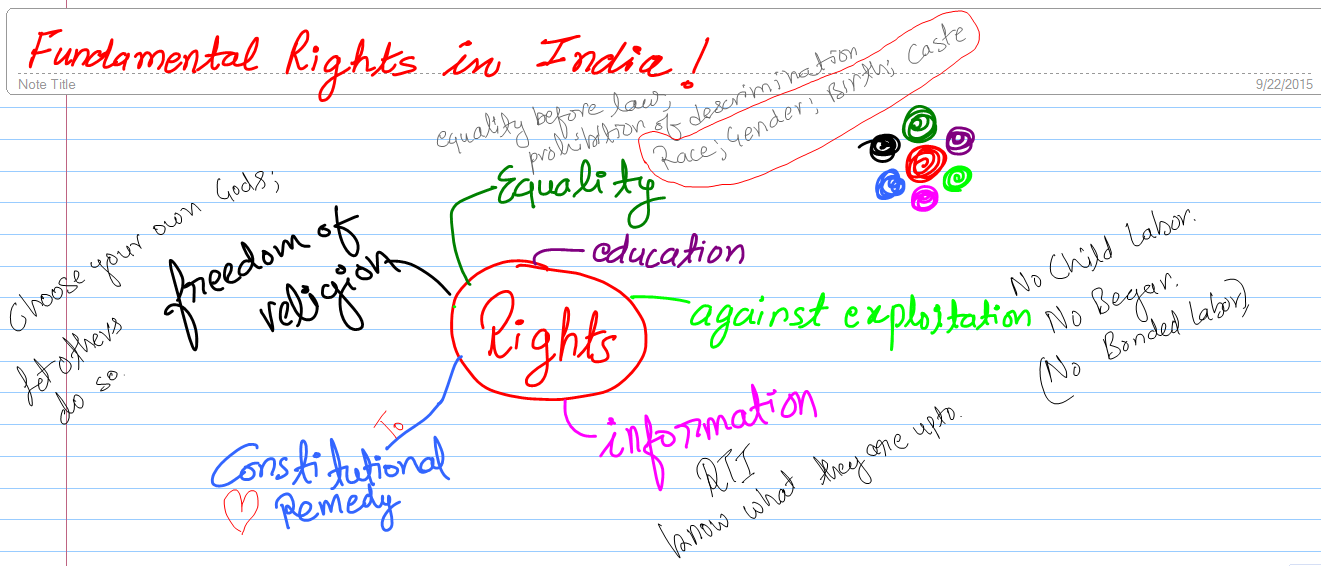For starters you might want to read fundamental rights in India.
FUNDAMENTAL RIGHTS
General
- Definition.
- Laws inconsistent with or in derogation of the fundamental rights. Right to Equality
- Equality before law.
- Prohibition of discrimination on grounds of religion, race, caste, sex or place of birth.
- Equality of opportunity in matters of public employment.
- Abolition of Untouchability.
Abolition of titles.
Right to Freedom
Protection of certain rights regarding freedom of speech, etc.
- Protection in respect of conviction for offences.
- Protection of life and personal liberty. 21A. Right to education.
Protection against arrest and detention in certain cases. Right against Exploitation
Prohibition of traffic in human beings and forced labour.
Prohibition of employment of children in factories, etc. Right to Freedom of Religion
Freedom of conscience and free profession, practice and propagation of religion.
- Freedom to manage religious affairs.
- Freedom as to payment of taxes for promotion of any particular religion.
Freedom as to attendance at religious instruction or religious worship in certain educational institutions. Cultural and
Educational Rights
Protection of interests of minorities.
- Right of minorities to establish and administer educational institutions.
[Repealed.] Saving of Certain Laws
31A. Saving of Laws providing for acquisition of estates, etc.
31B. Validation of certain Acts and Regulations.
31C. Saving of laws giving effect to certain directive principles.
31D. [Repealed.] Right to Constitutional Remedies
Remedies for enforcement of rights conferred by this Part.
32A. [Repealed.]
Power of Parliament to modify the rights conferred by this Part in their application to Forces, etc.
- Restriction on rights conferred by this Part while martial law is in force in any area.
- Legislation to give effect to the provisions of this Part.
Then read this PDF for above mentioned topics.
The eight fundamental rights recognised by the Indian constitution are:
1. Right to equality: Which includes equality before law, prohibition of discrimination on grounds of religion, race, caste, gender or place of birth, and equality of opportunity in matters of employment, abolition of untouchability and abolition of titles.
2. Right to freedom: Which includes speech and expression, assembly, association or union or cooperatives, movement, residence, and right to practice any profession or occupation (some of these rights are subject to security of the State, friendly relations with foreign countries, public order, decency or morality), right to life and liberty, right to education, protection in respect to conviction in offences and protection against arrest and detention in certain cases.
3. Right against exploitation: Which prohibits all forms of forced labour, child labour and traffic of human beings
4. Right to freedom of religion: Which includes freedom of conscience and free profession, practice, and propagation of religion, freedom to manage religious affairs, freedom from certain taxes and freedom from religious instructions in certain educational institutes.
5. Cultural and Educational rights: Preserve the right of any section of citizens to conserve their culture, language or script, and right of minorities to establish and administer educational institutions of their choice.
6. Right to constitutional remedies: Which is present for enforcement of Fundamental Rights.
7. Right to life: Which gives the right to live with human dignity. This includes rights such as right to education, health, shelter and basic amenities that the state shall provide.
8. Right to education: It is the latest addition to the fundamentals rights.
9. Right to Information:RTI stands for Right To Information and has been given the status of a fundamental right under Article 19(1) of the Constitution.
Remember - you will have to keep updating your knowledge on Laws India's parliament and state governments pass.
One such place is PRSIndia. Read this question on Quora.
Google search "Police laws and acts, india" - you will get lucky.
About beating and mistreating, any body can do that. You do not have to be in police for doing so. You do not have to be weak, old or poor for getting beaten.
Examples: Poor people beat their kids and wives. Frustrated wives beat their husbands. Salman Khan slapped Aishwarya Rai. And so on.
All you can do is read about the law, gain information and use it.
Edit: Adding an image (for visual stimulation)

None of this constitutes a legal advice. These are opinions.
